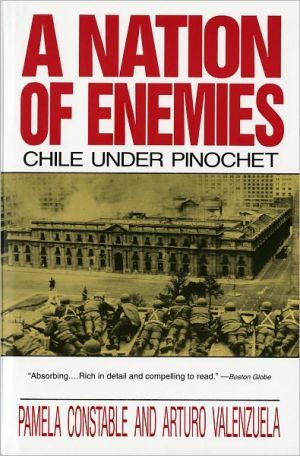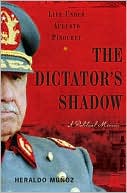Nation of Enemies: Chile under Pinochet
"This will stand as the definitive work on Chile under Pinochet for many years to come."—Library Journal\ How Chile, once South America's most stable democracy, gave way to a culture of fear. The authors explain and illuminate the rift in Chilean society that widened dramatically during the Pinochet era.
Search in google:
"This will stand as the definitive work on Chile under Pinochet for many years to come."—Library Journal Publishers Weekly In their rigorous examination of the regime of the ``Franco of Chile,'' the authors describe the 1973 coup that ended the brief socialist experiment of Salvador Allende (the first freely elected Marxist head of state) and explain how Augusto Pinochet came to dominate the junta and attained personal and institutional control ``unrivalled by contemporary military regimes anywhere else in Latin America.'' Based on hundreds of interviews with Chileans of all backgrounds and political views, Constable and Valenzuela chronicle the hate-driven campaign of oppression that sharpened divisions between left and right, rich and poor, civilian and military, and ``turned the state into a monster'' capable of torture and mass killings. The authors also describe the rapid economic development directed by Pinochet's ``Chicago Boys,'' a team of U.S.-trained technocrats who initiated a bold venture into free-market economics that led one segment of Chileans to prosperity while another sank into poverty. Finally, they describe the circumstances under which Pinochet, ``the last of South America's modern-day dictators,'' was forced to step down in 1989. Constable is foreign correspondent for the Boston Globe ; Valenzuela is director of the Center for Latin American Studies at Georgetown University. (Sept.)
\ Publishers Weekly - Publisher's Weekly\ In their rigorous examination of the regime of the ``Franco of Chile,'' the authors describe the 1973 coup that ended the brief socialist experiment of Salvador Allende (the first freely elected Marxist head of state) and explain how Augusto Pinochet came to dominate the junta and attained personal and institutional control ``unrivalled by contemporary military regimes anywhere else in Latin America.'' Based on hundreds of interviews with Chileans of all backgrounds and political views, Constable and Valenzuela chronicle the hate-driven campaign of oppression that sharpened divisions between left and right, rich and poor, civilian and military, and ``turned the state into a monster'' capable of torture and mass killings. The authors also describe the rapid economic development directed by Pinochet's ``Chicago Boys,'' a team of U.S.-trained technocrats who initiated a bold venture into free-market economics that led one segment of Chileans to prosperity while another sank into poverty. Finally, they describe the circumstances under which Pinochet, ``the last of South America's modern-day dictators,'' was forced to step down in 1989. Constable is foreign correspondent for the Boston Globe ; Valenzuela is director of the Center for Latin American Studies at Georgetown University. (Sept.)\ \ \ \ \ Library JournalVeteran journalist Constable and distinguished academic Valenzuela re-create life for most ordinary Chileans during the past 20 years when "they were dubious spectators caught in a system that they had not chosen.'' Chile had a 150-year-old tradition of stable democracy and civilian rule. Yet from the coup that ousted President Allende in September 1973 until March 1990 when Patricio Alywin was inaugurated as President of Chile, General Augusto Pinochet and the military completely dominated Chilean life. Based on broad sources, including many interviews, this book chronicles without ideological bias the lengthy struggles for the reemergence of democracy in Chile and concludes that after two decades Chileans grew tired of hating each other and have regained "new appreciation for the values of moderation and compromise.'' Written for both general and academic audiences, this will stand as the definitive work on Chile under Pinochet for many years to come. It belongs in all public and academic libraries.-- James Rhodes, Luther Coll., Decorah, Ia.\ \








